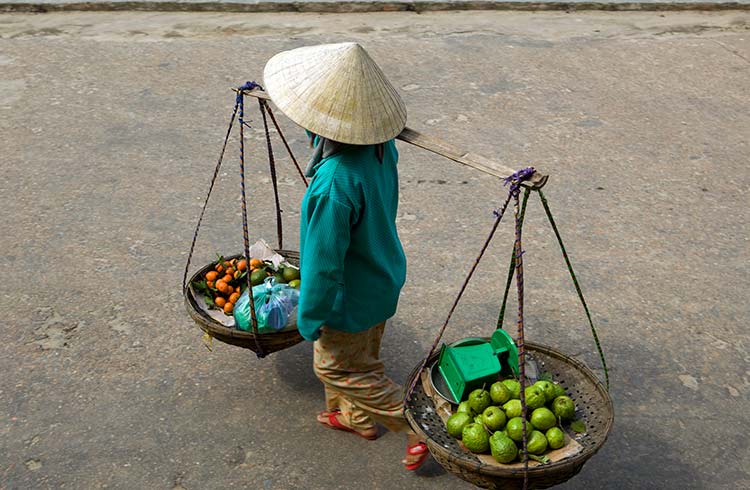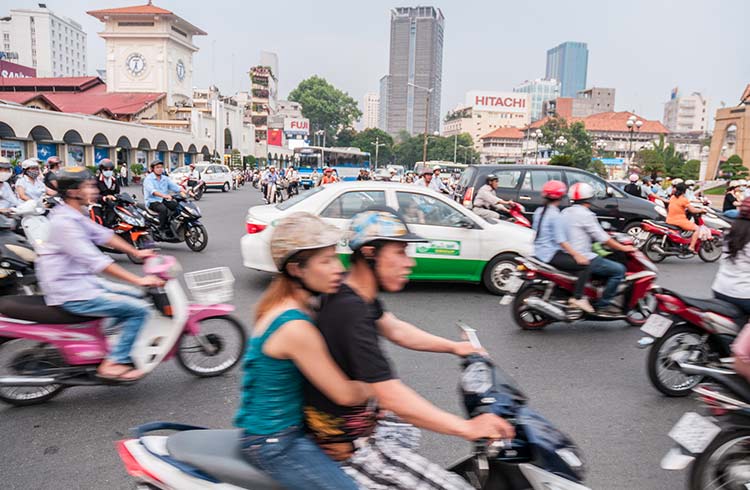Crime in Vietnam: How to Spot Travel Scams and Rip-Offs
Vietnam is generally a safe place to travel to but, like any country, it isn't without its share of scams and petty crime. Here's what you need to know to avoid becoming the next target.
 Photo © iStock/laughingmango
Photo © iStock/laughingmango
To give or not to give?
Exploring the streets of Vietnam you are likely to see signs of poverty such as people begging in the streets or children pushing you to give them money or buy items from them.
The kids on the streets of Vietnam do need help, but keep in mind that giving them money isn't the best option as often the child is being exploited by an adult. The majority of the time any money, or item that has selling value, will not go to the child and often they are not attending school as a result of this exploitation. Consider donating money or required items to organizations that help lift locals out of poverty or volunteering your time.
Petty crime in Vietnam
Crime in Vietnam is low, but it's best to keep it on your radar just like anywhere else you travel. Don't leave your bag dangling from your body, as the infamous “Saigon Cowboys“ love the drive-by snatch. Keep valuables in your hotel safe so if you do come across a snatcher, you can just let your bag go and head to the markets for a new one. Don't try to hang onto your bag or you may risk being dragged or injured.
Some children in the streets of Vietnam, particularly in Ho Chi Minh City and Hanoi are adorable but sneaky. They're able to lift wallets, cameras, and passports without effort. While talking to one, keep an eye on the other.
Scams in Vietnam
Hotel scams
When a hotel becomes popular, others actually spring up with the exact same name in hopes of stealing business. Confirm the address of your hotel, rather than just giving the taxi driver a name.
One of the most common scams visitors encounter is the oldest in the book. If a taxi driver tells you the hotel you are going to have closed down or is full, make sure you are taken there anyway. Taxi drivers attempt to take travelers to friends' or family-run accommodations, where they will receive a commission for their efforts. This scam is huge in Hanoi, where the streets are confusing, and you just want to rest away from the noise.
Hotels in Vietnam have been known to double rates upon checkout by claiming that the price quoted was per person, rather than per night. Ensure you confirm rates and payment upon arrival. Better still, book and pay in full before arriving.
Motorcycle scams
Motorbike rentals where the owner steals back the bike.
In places like Mui Ne and Nha Trang, the police also impound the bike and can charge you extortionate amounts to get it back. The bike owner will also charge you for the loss of the bike in order to get back your passport. Mechanical problems can be another issue. Always use your own lock, test drive the bike and ensure that you have a Vietnamese driving permit.
Transport scams
Cyclo/tuk-tuk drivers taking you to the middle of nowhere and overcharging you to get home. Avoid this by agreeing on a price before you hire one or booking via your hotel or tour operator.
Some drivers will also use sleight-of-hand tactics to switch whatever money you pay them with to smaller denominations. A favorite is switching the 500,000 VND to a 20,000 VND as they are both blue in color. Avoid being duped by paying with small denominations.
Fake train tickets are sold by touts at the station or via online websites. Use websites like Rome2Rio and Seat61 to find information about train travel in Vietnam and buy your tickets online.
Sneaky local scams
No matter how friendly and helpful some people on the street can seem, things aren't always what they seem to be. Shop owners will often try to get you into their shop, or partake in a card game, or to buy a very expensive round of drinks/tea at a bar.
Some vendors invite you to take a photo of them or their products such as the fruit ladies of Hanoi, bamboo basket vendors, bug sellers etc. They will then turn around and demand an exorbitant fee, a tip or for you to buy their products.
Tips to deal with scams
If you're confronted with a tricky local, here are a few things to keep in mind:
- Always inspect your goods (especially electronics) after purchasing them. A common scam is to switch the items you have purchased for cheaper versions.
- Although the official currency of Vietnam is the Vietnamese dong, many prices for food, hotels, and transportation are quoted in US dollars. Always confirm what currency a price is in. For example, if a vendor tells you that something is "five" it can mean 5,000 dong (around 25 cents), or US $5.
- Pickpocketing and motorbike bag snatching – especially in Ho Chi Minh City, Hanoi and Nha Trang – are on the rise. Injuries can occur when travelers attempt to hold onto their bags. If this happens to you while you're crossing the road, let the bag go. Your safety is more important than your belongings.
- Taxi drivers like to set their meters to jump at a speedy rate, so you end up paying more for a short journey. Play it safe, and only use Mailinh and Vinasun taxis. You should be able to recognize them for their colors and logos.
Related articles
Simple and flexible travel insurance
You can buy at home or while traveling, and claim online from anywhere in the world. With 150+ adventure activities covered and 24/7 emergency assistance.
Get a quote

6 Comments